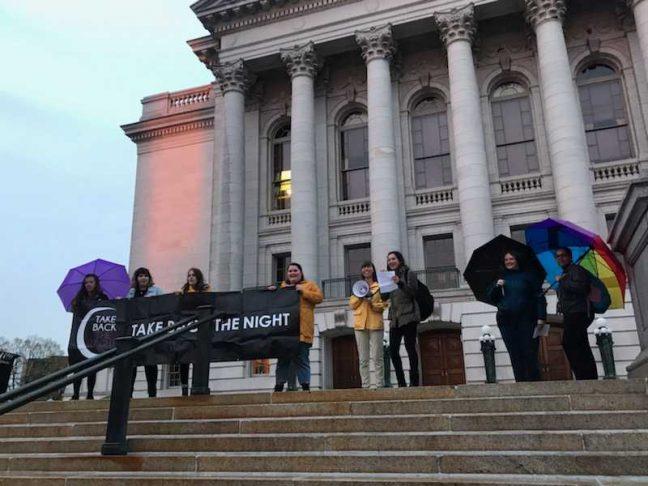Despite the rainy weather, students and community members gathered at Library Mall to join the Take Back the Night march demanding the end to sexual assault both on campus and in the Madison community.
Organized by the University of Wisconsin chapter of the National Organization for Women, the march started at Library Mall, proceeded down Langdon and ended on the steps of the Capitol.
Several speakers addressed the crowd, including newly elected Mayor Satya Rhodes-Conway, who recounted her first Take Back the Night march back in high school and said as long as there was a need, she would continue marching for the cause.
“I march because we live in a society that condones sexism and harassment and sexual violence, because consent culture is not yet universal, because rape culture still is, because women of color and LGBTQ folks are still targeted,” Rhodes-Conway said.
Public Affairs Organizer for the Planned Parenthood Advocates of Wisconsin Katrina Morrison, a UW graduate, reiterated the importance of creating an inclusive community where everyone’s voice can be heard.
Morrison also made a special mention to marginalized groups who she said were often left out of the conversation.
“That includes women of color, undocumented people, transgender, non-conforming and expansive, intersex people as well as those with disabilities. In order to see real change on campus and in Madison, and throughout the nation, we need to center the voices and lived experiences of those most affected,” Morrison said.
Morrison also gave credit to the various support resources available for sexual assault victims on campus. She said these resources help provide comfort and support for students.
Senior Carolyn Hamburg joined the march for the first time. Hamburg shared her views on the resources available, and the ways she believes the UW should continue improving in order to provide a more holistic and effective support system for students.
“I think that where we put our financial resources said so much about what we care about on this campus,” Hamburg said. “Giving more [financial resources] to survivor support is so important.”


